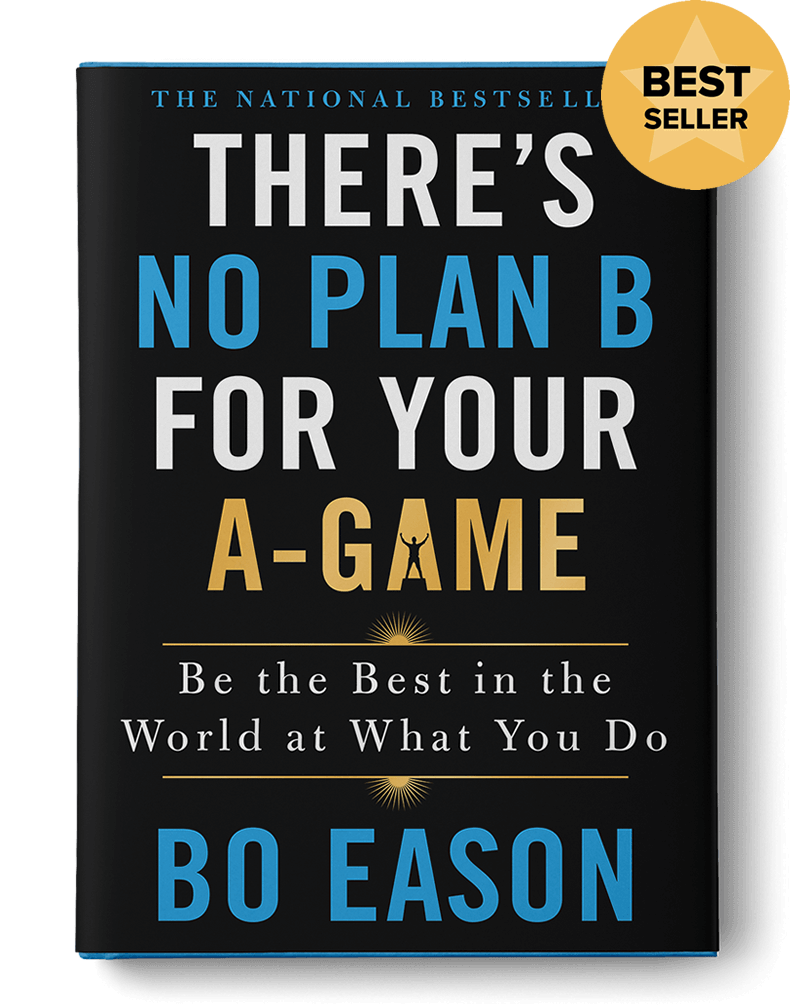Bo: All right, we’re here with Dr. Joan Rosenberg and what we’re going to do now is we’re going to turn the tables. And Joan is going to ask me a few questions. Okay, here we go. Go, Joan.
Joan: So, Bo, I know a lot of men come up to you and they are so grateful for the model that you are for them. Part of that has to do with the attractiveness that they feel toward you. When they talk about “Bo crushes” …
Bo: Got it.
Joan: A lot of men I’ve heard talk about it. They have kind of a “man crush” on you. But it comes from how you model your expressiveness in front of them. Talk about you and feeling—having access to those feelings, and we’ll go from there.
Bo: Okay. Well, as you know, I trained really hard for many, many years with great coaches, you know, acting coaches—I hate to use “acting coach” because they’re so much more than that. Movement coaches, you know them, they’re the best in the world. The one thing they trained me to do, and all performers, was to have access to all your emotions. So they would describe it like this, they described emotion as if it was electricity and the electricity was behind these walls and all we needed was an outlet to plug into that emotion. We didn’t care what emotion came. Right? We cared that emotion came. If we plugged in a toaster, we got electricity. If we plugged in a light, we got light. They wanted me to have access to my emotions. They didn’t want me to control the emotions. You know what I mean? They didn’t want me to go, “Well, I think I’ll cry here and then I think I’ll get mad here.” They just wanted you to have access to all emotions and whatever came up, you didn’t fight that, you let that happen.
Joan: Okay, men are very practiced at, and they’re socialized to shut it down.
Bo: Yeah.
Joan: Don’t go there. Don’t show it. Just keep it shut down. What do you say to that? Because you don’t do that.
Bo: I’ve really been trained to drop that armor that we use to protect ourselves. You know, men are great at it. Often men who are on stage, like speakers, they’ll want to be vulnerable. That’s a big buzzword these days—vulnerability. You should be vulnerable. And then we start heading for vulnerability. I think that’s a mistake every time. It looks kind of wimpy on a man to go toward vulnerability. I think you go toward the most courageous act, which is to open this vessel up and express this thing, which then makes you vulnerable. I think everyone mistakes vulnerability with crying. Right?
Joan: It’s not that.
Bo: So I get men a lot of times going, “Well, I really want to cry on stage,” and I go, “Well, that’s going to be a problem.”
Joan: Right. Vulnerability is not crying. I think of vulnerability as openness and a willingness to learn to be hurt. So you’re actually opening yourself up. That’s what vulnerability really is. So now I’ve watched you as the feelings rush up, your lip quivers, you get a little bit tearful, your face gets flush, but you stay present with the feeling. Talk about that.
Bo: Yeah, that’s a big mistake too is that whenever those emotions come up—I remember I used to be like that 20 or 25 years ago—whenever emotion came up, I thought it was bad and I would contain it and push it down. When I was training I was taught to not do that. And you know what my teacher said—Roy London used to always say this, “You just ruined what God handed you. God handed you that emotion and you destroyed it. You ruined it for all of us.” Right? And I don’t think he was a religious man but he would say, “God just showed up and you told him no.”
Joan: So then what do you have to say, particularly for men but women do it too though, about staying present with the feeling because you’re out on stage and everybody is seeing you get flush, they can tell you’re in it, you’re present with the feeling and they know to just sit there and to be present with you. So when Roy says ‘don’t push that gift away’, how do you stay present with the feeling? What would you say about that?
Bo: That is the most courageous act is to hang in there for just a few seconds more and a few seconds more and a few seconds more. Just let it happen.
Joan: Right. So you’re kind of riding the wave.
Bo: Yes.
Joan: I always talk about riding the wave of feeling. We actually feel our feelings in our body first. We’re thinking about something and then we feel it. Lots of times we actually notice it in our body first and then we give a name to it. What I always talk about is this idea of riding the wave of feeling. You never hear about feelings coming down. You always hear about feelings coming up. So what you want to do is actually just kind of ride the wave of the feeling and it lasts roughly 90 seconds.
Bo: I think that’s where men get a little bit nervous. I think we think it’s never going to go away. We think we’re going to live in this weepy, emotional place and we’re not.
Joan: No, no. What I like to say is that at some point you’re going to have to blow your nose. You’re going to have to get up and go to the bathroom. You’re going to have to go do something different and it’s going to break. So think of it as just you’re going to ride one or more waves of whatever the feeling is and it’s not going to last. Each individual wave is not going to last more than roughly 90 seconds.
Bo: And if you think of it like that’s your connective tissue as a man, other men will follow you into battle. Women will help you build that battlefield. They’ll take down the forest to help you build it if you’re allowing yourself to be human, which, you know, as speakers, most people want to be a speaker with no humanity, just a speaker. Well, if you’re a speaker with no humanity, you’re not going to be a speaker for very long.
Joan: Right. Actually, what I love saying is that if we only express our thoughts, absent the emotion, that’s like Elmer’s glue. When the emotion is present then it’s like super glue. That’s actually what allows us to bond more closely and that’s why men get inspired or women get inspired and want to be with somebody because that connective tissue is the feeling, is the super glue that bonds us together.
Bo: You’re totally right. That’s exactly what it is. I mean think back to the last time any of you were kind of turned off by somebody or not particularly attracted to them for some reason, just because there was nothing there to be attracted to. They might have been good looking but there was no attraction. And then that person you saw that CRACK, just for a second, and you went, “Ahh,” and you fell in love with that person. This happens daily, right, if somebody allows that crack to happen. You know where that happens a lot? In sports it happens a lot because they’re so trying to win and they’re giving everything they got and they’re strong men and women, these athletes, or it could be a ballet dancer or a gymnast. They’re giving so much of themselves, that’s true vulnerability. Yet they’re strong and muscular and stoic. The minute they crack a little bit is the minute you fall in love with them and you’re attracted to them. Well, the same is true for you as a human, as a man, as a speaker, as a leader. The moment that you have the ability to allow that to happen, don’t mess with it too much, just allow it to happen and go forth, people will follow you. People will do what you’re asking them to do. They will help you build your company and your career. That’s great. I love it. Good question. Thanks.

